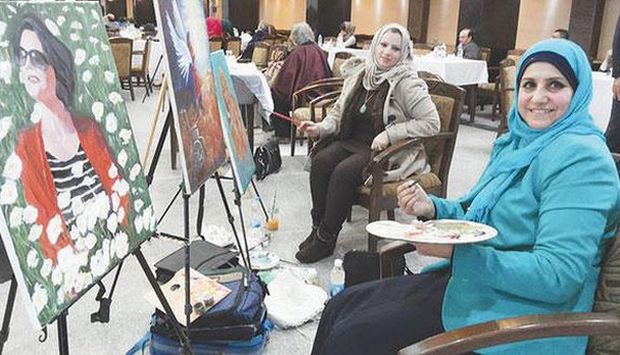
Women paint at an art symposium in the Iraqi capital Baghdad jointly organized by the Voice of Independent Women and the Female Fine Arts Association. (Asharq Al-Awsat)
Baghdad, Asharq Al-Awsat—Female activists in Baghdad have established Women for a Civil Iraq, an organization that aims to promote Iraqi civil culture, preserve human rights and freedom of expression, and promote the separation of religion from politics in the country.
To honor its establishment, a conference was jointly held by the Voice of Independent Women and the Female Fine Arts Association which included a drawing symposium attended by artists known for representing in their work a desire to see a civil society in Iraq without wars and the abuse of women.
Iraqi women across the country, especially in rural areas, are still subjected to different practices of violence as well as problematic outdated family laws that fail to serve their needs or offer them protection. Women are also currently facing attempts by religious fundamentalists to establish new laws that would further diminish their position in the family and in society. Activists are now seeking to curb these practices and to uphold women’s rights as stipulated in the Iraqi constitution.
In a statement to Asharq Al-Awsat, Chief of the Voice of Independent Women, Lame’aa Al-Talbani, said: “As Iraqi women from difficult social circumstances, we felt that it was time for us to act towards establishing a civil system in which equal opportunities are open to all.”
Talbani added that the association was seeking to “mobilize the largest number of women and men possible to pressurize state officials into adopting a civil law system after all past systems have only managed to produce hardline extremist groups, creating the situation we see today.”
Civil activist and artist Ban Abdelatif, a participant in the event, said: “Iraqi women have had distinct roles throughout their country’s history. However, attempts are being made today by the government and influential bodies within the country to curtail the role of women under the cloak of religion—reminiscent of what women experienced several centuries ago.”
She added: “Our call today for a civil association means that we are working towards the establishment of a civil state and its correlated laws, freedoms, rights, political representation, and the peaceful transfer of power, as well as creating a constitution that seeks to provide equal opportunities.”
Among other demands, the Women for a Civil Iraq charter appeals for decisions to be made by the people with the full and equal participation of women. “Towards this objective, international agreements on women must be activated, laws of blatant discrimination against them must be nullified, and the Status law must be amended. The issues of widows and homeless and displaced women must be addressed in a manner commensurate with human rights,” it states.
The charter adds that “personal freedom must ensure that individuals live their own life without interference from the government” and that “they should be free to develop their own talents and have their own projects.”
